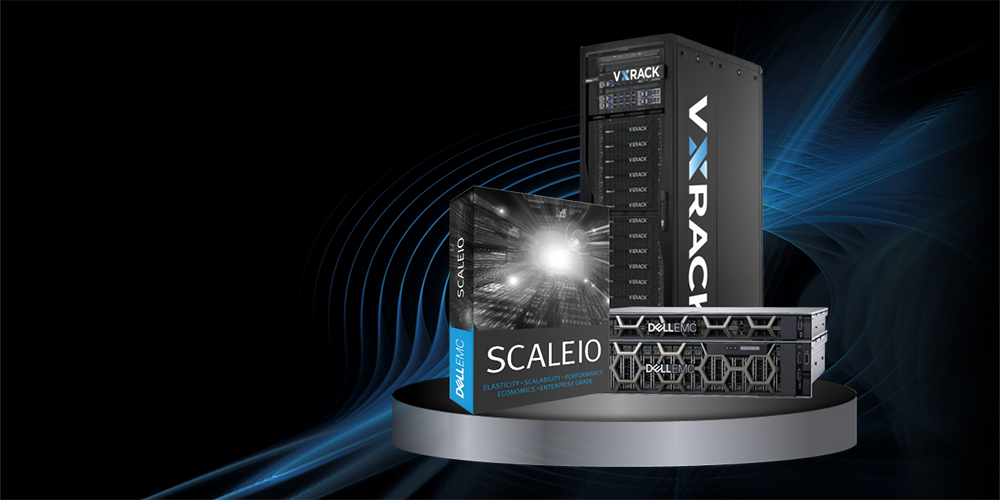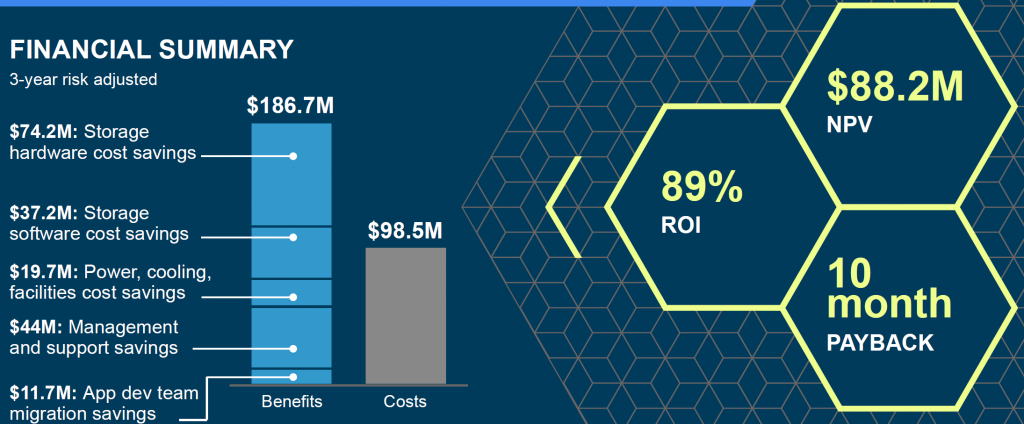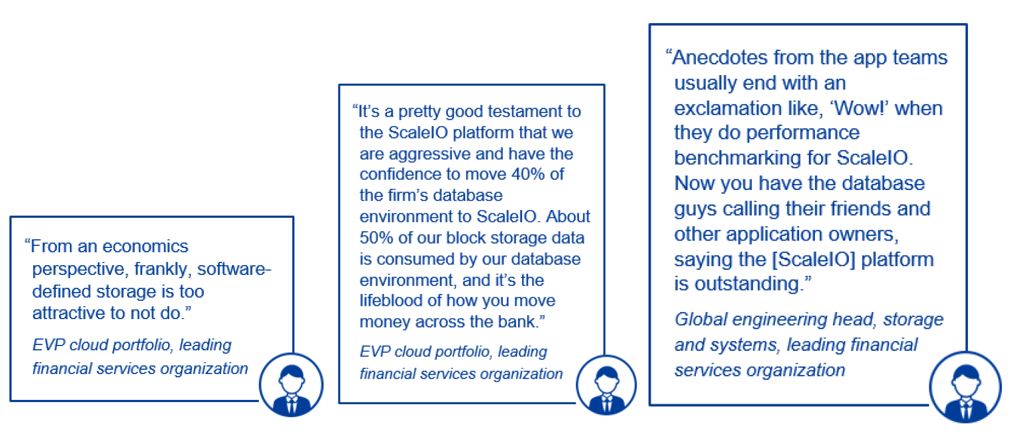Save $88.2M in costs – Check. 140,000 hours of developer productivity saved – Check. 20 million+ IOPS – Check. 5X improvement in deployment time – Check. Data migration – Every 25 Years…Check!

Dell EMC commissioned Forrester to interview a large, global financial institution – a long standing Dell EMC ScaleIO customer – to create a Forrester Total Economic Impact report. Forrester TEI reports are well regarded throughout the industry as objective, impartial studies of products’ and technologies’ economic impact on a business. The results were simply outstanding.

Forrester estimates that the customer enjoyed $186.7 million in total benefits, a savings of $88.2 million after deploying ScaleIO over a period of four years with an outstanding ROI of 89% and a payback period of only 10 months. This includes categories such as CapEx savings from storage hardware and software, savings from power cooling and facilities, OpEx savings from management and support and substantial savings from avoiding disruptions from migrations by the application team. The customer expanded their ScaleIO deployment from a single datacenter to 8 data centers in a short period of 18 months and estimates that 72 PBs of storage will be managed by ScaleIO within the next four years.
Before ScaleIO
Prior to using ScaleIO, the interviewed customer embarked on a strategy initiative to transform into a digital organization, shifting over $1 billion from the IT infrastructure budget to application development areas to fuel client innovation. At the same time, the financial crisis forced the bank to invest more heavily in IT to increase collaboration and reduce costs. These drivers led to increased growth in storage and infrastructure requirements to support these projects. At a 30% annual growth rate of the organization’s SAN storage environment, the pace of growth was offsetting the benefits from traditional storage as the cost of managing storage in silos got bigger each year. The organization realized that it needed a cost-efficient storage solution that could scale with the enterprise.
After ScaleIO
Today the customer has thousands of developers on the ScaleIO platform managing thousands of applications and their number keeps on expanding rapidly. For example the customer expects to have 40% of databases running on ScaleIO by 2019. The typical storage pod has anywhere between 90 to 110 servers in a single ScaleIO cluster which, though a big number, is only a fraction of the total number of servers that CAN be managed in a single ScaleIO cluster. ScaleIO’s outstanding performance has won many fans in the customer’s organization as each all-flash configured pod can easily provide 20 million IOPS.
Capex Savings
The customer’s total CAPEX savings of $111 million is generated by large savings from mainly three categories.
- From massively consolidating multiple silos of underutilized storage. With ScaleIO’s excellent performance, scalability, flexibility and reliability, the customer is able to pool storage resources much more efficiently and significantly consolidate multiple islands of traditional storage down to an optimal footprint.
- All features are included in the ScaleIO pricing. There is no separately charged feature license.
- Avoiding Fiber Channel. By not having to deploy Fiber Channel SAN hardware and software which include Fiber Channel switches, directors, software licenses, cables, racks and HBAs.
In order to reap these savings over four years, the customer invested $71.7 million in ScaleIO software and hardware.
Opex Savings
This organization reported that “from a labor support perspective, the operating costs of ScaleIO are one-tenth the operating costs of traditional storage.” Part of this cost reduction was due to the elimination of “big lift and shift” storage array upgrades.
Management and support cost savings came from easier deployment activities such as bidding, capacity planning, and faster provisioning of storage. For example, they were able to stand up a pod in 31 days with ScaleIO when compared to six months in a traditional block storage environment. This translates to a 5X improvement or 83% reduction in deployment time. Further, they were able to eliminate forklift upgrades and data migration costs resulting in 140,000 hours saved from approximately 3,500 developers saving 40 hours on an average. Lastly, the IT infrastructure team was also able to reduce management effort with virtualization and consolidation. In total, the customer saves an estimated $55.7 million over four years.
In order to reap these savings the customer invested $19.6 million in operating expenses for ScaleIO. These included Implementation costs, Labor costs and Ongoing Management costs.
Data Center Costs
Finally, the organization provided estimates from 30% to 98% reduction in power, cooling and facilities costs across the organization. One interviewee noted that with the efficiency brought by its ScaleIO investment, the organization now had more space in the data center to run other hardware. This is a valuable benefit as the cost of building a new data center when an organization runs out of space can run into millions of dollars.
In aggregate the customer is estimated to save about $20 million over four years. The data center costs for ScaleIO over the same period of time are expected to be about $7 million.

In Summary
ScaleIO is a transformational technology. As validated in the TEI report, a customer can completely redefine their IT processes – add agility, accelerate deployment, completely eliminate migrations altogether and reduce costs significantly through massive consolidation by adopting ScaleIO. As we move towards a new era in IT where software defined infrastructure is the NEW norm, ScaleIO is the perfect enterprise grade software defined storage for ALL enterprise applications.
Resources
Full Study: The Total Economic Impact Of Dell EMC ScaleIO
Infographics: 1 Pager
